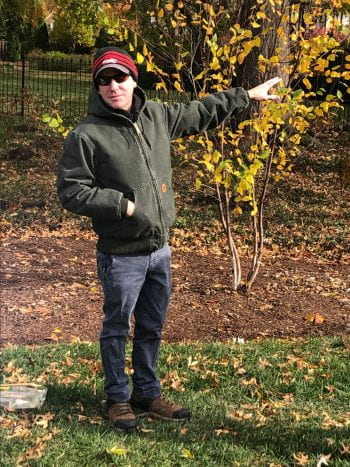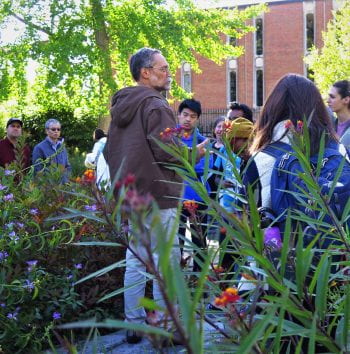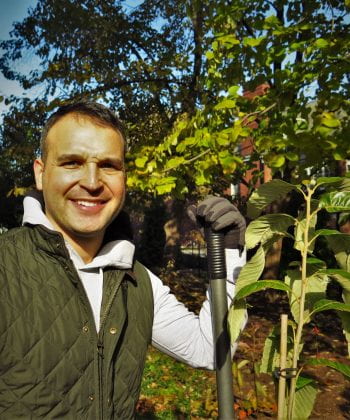Since 2010, WashU has proudly carried the recognition of “Tree Campus USA” for its commitment to promote healthy trees and generate excitement for the campus canopy. Trees provide a number of invaluable services, including sequestering carbon from the air, reducing the urban heat island effect, providing habitat for native species and food for pollinators, and, of course, creating a beautiful outdoor environment for our community.
Through a variety of education and outreach efforts, we celebrate the richness of our arboretum and provide opportunities for students, faculty, and staff to learn more about identification and characteristics of the trees, shrubs and flowers around campus. In addition, many people from beyond WashU come to campus to enjoy this programming. This year’s offering was richer than ever as WashU celebrated the ten-year anniversary of its Tree Campus USA certification, as well as its traditional arbor walk.
Arbor Walk Anniversary Activities
For the past 10 years, Kim Cummins, Assistant Dean of the McKelvey School of Engineering, has coordinated Arbor Walks nearly every semester to spread knowledge and appreciation of campus trees to the community. Her involvement as the volunteer who leads the efforts is thanks to her personal love of the campus trees. On each tour, she is joined by dozens of people who gather to learn from campus arborist Kent Theiling as he leads this unforgettable tour.

Kent’s successor Chris Anderson, grounds manager and horticulturist
Kent, who will be retiring soon, was surprised with a tree planting in his honor in the Butterfly Garden. He took the opportunity to share a few emotional sentiments about his time and accomplishments at WashU. He reinforced his trust in the people who have been working alongside him, and who will continue enhancing the campus landscape and canopy. Kent’s successor Chris Anderson, grounds manager and horticulturist, and Cody Azotea, Focal Pointe account manager and landscape specialist, have both been champions in advancing landscape sustainability goals at WashU.
In addition to two tours of the East End’s new landscape, the 10th anniversary of the Arbor Walk offered various activities including a panel discussion and overview of the history of WashU’s trees, raffle prizes, and several tree plantings on the East End.
Foraging Workshop with Stan Braude
In partnership with the Burning Kumquat and the Tyson Conservation Corps, Stan Braude,

Stan Braude, professor of the practice of biology, leading the Foraging Workshop
professor of the practice of biology who recently received the Arts & Sciences Distinguished Teaching Award, offered an on-campus Foraging Workshop. As part of Food Week 2019, the event attracted 30+ attendees eager to learn how to identify edible trees, bushes and greens around campus and St. Louis.
Professor Braude included plants like sugar maple, pawpaw, serviceberry, hazelnut, redbud, persimmon, pecans, and some others along the journey, starting from the Burning Kumquat garden and continuing on to the Butterfly Garden and the landscapes bordering Forsyth Blvd. Participants took home cooking tips and advice on how to grow, forage, harvest, and consume the edible parts of native plants.
Annual Tree Planting Day
Every fall since 2014, WashU alum David Dresner brings together student volunteers, the Office of Sustainability, Dining Services, Facilities’ grounds team, and contractors Focal Pointe and Bon Appetit in what has become a late fall tradition to plant trees and enjoy hot beverages in the cold weather.

David Dresner, founder and CEO of Sleeve a Message.
Graduating from the Olin Business School in 2010, David Dresner founded Sleeve a Message, a St. Louis-based company that develops custom coffee sleeves for many well-known companies across North America, including WashU. Sleeve a Message committed to offset its carbon footprint by planting one tree for every 7,000 sleeves manufactured. At WashU alone, Sleeve a Message has supported the planting of 409 trees! In total, the company has planted nearly 30,000 trees.
“As a business owner, I’ve been given a unique platform to educate and lead our community in the march towards sustainability and a healthier planet. I’m extremely humbled to have another opportunity to give back to my alma matter in a way that can be enjoyed for many years to come,” said David.
Sleeve-A-Message also demonstrates its commitment to sustainability through the responsible sourcing of ink and paper, which is primarily made of post-consumer recycled materials.
Continued efforts
Washington University in St. Louis has been awarded a Level 1 accreditation by the ArbNet Arboretum Accreditation Program and the Morton Arboretum for achieving standards of professional practices deemed important for arboreta and botanic gardens, and is on track to achieve level 2 by early 2020! The ArbNet Arboretum Accreditation Program is the only global initiative to officially recognize arboreta at various levels of development, capacity and professionalism.
WashU has adopted a goal to increase overall canopy from 16% up to 35% by 2035. Despite losing some of the most significant canopy trees with the East End construction project, we are on track to meet the 2035 goal, thanks to planting and transplanting more mature trees, and planting hundreds of trees each year. Succession planting requires planning for new trees over longer periods of time to avoid having many trees replaced at the same time. Currently, the Danforth Campus boasts 169 acres featuring a diverse collection of trees. The 4,500 trees on campus range from well-established historical trees to newly planted climate-resilient ones.
Danforth campus has followed a long-term Tree Framework Plan since 2013 for tree care, maintenance and planting of new trees. A wide variety of non-traditional, highly performative landscapes set WashU’s campus apart, both in beauty and in functional habitats.
